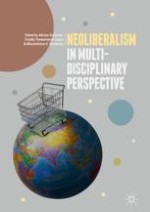2019 | OriginalPaper | Chapter
8. The Neoliberal Tourism System: Strategies of Production and Distribution of Travel
Author : Luis Gómez-Encinas
Published in: Neoliberalism in Multi-Disciplinary Perspective
Publisher: Springer International Publishing
Activate our intelligent search to find suitable subject content or patents.
Select sections of text to find matching patents with Artificial Intelligence. powered by
Select sections of text to find additional relevant content using AI-assisted search. powered by
